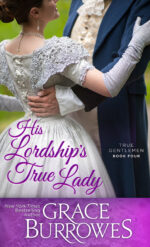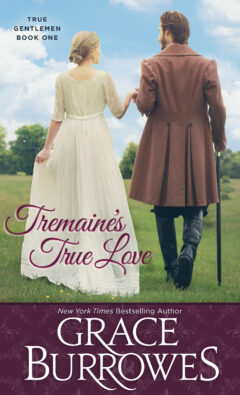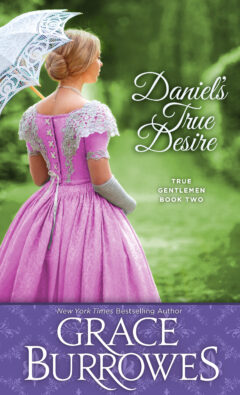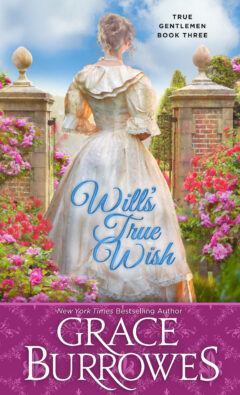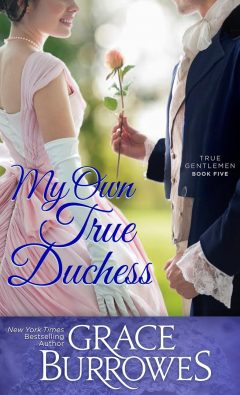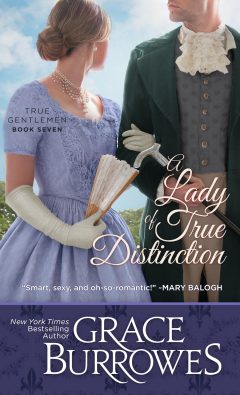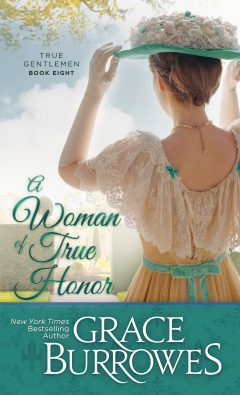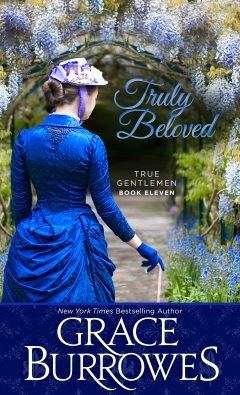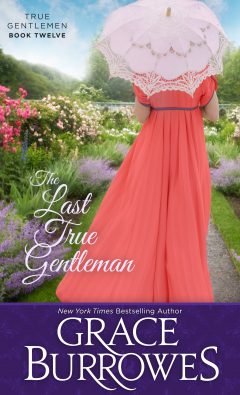His Lordship’s True Lady
Book 4 in the True Gentlemen series
Hessian Kettering, Earl of Grampion, tried marrying in haste as a very young man and got years of marital drama to go with his endless regrets. He’s older and wiser now, and has responsibility for an orphaned ward who needs a maternal figure. Hessian is determined that his next countess will be a settled, sensible lady with a spotless reputation. Lily Ferguson seems to fit Hessian’s requirements beautifully, and if she also kisses like his most cherished private dreams, that’s no reason to doubt his choice.
As an heiress from a good family, Lily Ferguson has been subjected to the attentions of fortune hunters and fawning nincompoops for years. Because the bachelors won’t take, “Stop ogling my settlements,” for an answer, she’s developed a reputation for being difficult. Lily finds spending time with Hessian Kettering so very easy though. He likes a woman who speaks her mind, and Lily adores a man who actually listens to the ladies in his life. But what will Hessian have to say, when he finds out Lily is not the heiress polite society thinks she is?
Enjoy An Excerpt







Chapter One
“Children, much less three children and one of them a female, will not do.” More strongly than that, Hessian Kettering could not put his sentiments, not in the presence of his niece. “I have no patience with noise, drama, or dirt, while children delight in all of the foregoing.”
Worth Kettering passed Hessian the baby, whose charming attributes included a penchant for batting at the noses of unsuspecting uncles.
“Lord Evers’s will names you as guardian of all three,” Worth said, pouring himself a fresh glass of lemonade. “Unless you want to tangle with Chancery—at considerable expense, I might add—then you have become the legal authority over three children. The boys will remain at school for the rest of the term, and for the girl, you simply hire a governess or two.”
Hessian did not attempt to sip from his own drink with an infant in his arms. The child was a solid little bundle with her papa’s dark hair and brilliant blue eyes—also a piercing shriek when she was unhappy.
Hessian and Worth were enjoying the morning air on the back terrace of Worth’s London town house, Worth’s Alsatian hound panting at their feet. The breeze was mild, the sun warm, and the plane maples providing just the right amount of shade.
That Lord and Lady Evers had gone to their reward seemed impossible. They’d been Hessian’s closest neighbors in Cumberland, and Lady Evers had been a friend.
More than a friend, for a very brief time.
“You raise another issue,” Hessian said, nuzzling the baby’s crown. Why were babies so wonderfully soft? “Children are expensive, and my coin is limited. I’m spending more than I should on this wife-hunting ordeal. I must have been daft to let you talk me into it. Ah, my niece knows a handsome fellow when she sees one.”
The baby was beaming at him, as only a baby could. Angels might exude as rich a benevolence as did one contented infant, and angels didn’t grin half so winningly.
“My daughter likes you because you resemble me,” Worth said, “and I wasn’t the one to convince you to come to London. That feat lies squarely at Jacaranda’s feet.”
Jacaranda being Worth’s wife and the mother of the little cherub in Hessian’s arms. “Why can’t they stay this sweet?”
“Children?”
“The ladies. I can muster a scintilla of patience for an innocent child, but the matchmakers will drive me straight to Bedlam.”
Hessian was the current Earl of Grampion, and however impoverished the title and distant the family seat—Cumberland was quite distant—earls were rare prizes, sought after by bankers’ daughters, American heiresses, and barons’ sisters.
Bachelor earls were also sought after by merry widows and straying wives, about which, some helpful brother might have warned a fellow.
The baby sighed a mighty sigh as if to echo her uncle’s sentiments, and Hessian tucked the child against his shoulder, the better to rub her little back.
“Your finances are healthy enough,” Worth said, draining his glass. “Especially considering where you were a few years ago. You have a talent for economizing.”
Worth was being kind, a tendency more in evidence since his marriage. “Three children will set me back considerably. Do you know how much it costs to launch a young lady in proper society?”
Hessian didn’t know exactly, but he’d seen the finery those young ladies sported, the carriages they drove, the millinery they delighted in. He saw their accoutrements at one social event after another, and in his nightmares.
“As it happens, I do know, because that’s my daughter you’re cuddling so shamelessly, and I’ve already set aside funds for her dowry.”
Babies were made for cuddling, brothers were apparently made for causing problems. “Lady Evers had a sister. Did the will mention her in any regard? Mention any family at all?”
Everybody had family, though Hessian’s family was limited to a younger sister, Worth, Jacaranda, and this darling child. So far. Given the mutual devotion of the baby’s parents, she’d have siblings by the score.
Worth scratched the hound’s ears. “Lord Evers was the last of his line, save for his sons. The boy Lucas is Lord Evers now, and if you coax my daughter to sleep, I will never forgive you. It’s too early for her nap.”
“She’s tired of listening to your prattling.” Hessian rose to take the baby on a tour of the garden, for, like her uncle, she delighted in the out of doors.
The dog looked to Worth, who got to his feet rather than allow Hessian to take the child anywhere unsupervised. Who would have thought Worth Kettering, former prodigal son, would be such a doting papa?
“Lady Evers does have a sister,” Worth said. “Mrs. Roberta Braithwaite, wife of the late Colonel Hilary Braithwaite. She’s something of a hostess, but being a widow, she’s hardly a suitable legal guardian for the next Lord Evers.”
Hessian recalled meeting the colonel and Mrs. Braithwaite several years ago at one of the Everses’ dinner parties.
“Mrs. Braithwaite won’t serve,” he said. “All I can remember of her is a tittering laugh and suspiciously orange hair.” And that Lady Evers had barely tolerated her sister.
No help there, for Hessian would not inflict on a small child the company of a woman he’d taken into dislike within five minutes of bowing over her hand.
The dog gamboled ahead to have a drink from a small fountain in the back corner of the garden. Hess’s own canine had remained in Cumberland, and though he’d had the beast five years, he couldn’t muster any longing for its company.
“Not only will Mrs. Braithwaite not serve,” Worth said, picking up a stick and tossing it over the dog’s head, “but the will awards you guardianship of these children. They can visit wherever you please, and the boys will doubtless spend much of the year at public school, but you have sole authority over them and their funds.”
Hessian raised his niece above his head for the sheer pleasure of seeing her smile.
“Drop her and I will kill you, Hessian, assuming Jacaranda doesn’t beat me to it.”
He slowly lowered the baby, who was grinning and waving her arms madly. “Your papa is a grouch. When he won’t let you have a pony, you come tell your dear Uncle Hessian, and I’ll buy you an entire team and a puppy.”
“Casriel already promised her a pony,” Worth said.
Casriel, as in the Earl of, was Jacaranda’s oldest brother. Hessian occasionally played cards with him when they were both of a mind to dodge the matchmakers.
“Then Casriel will have to un-promise her. I’m her godfather, and that means—Worth Kettering, you have become positively possessive.”
Worth had plucked the baby from Hessian’s arms. “Need I remind you, Jacaranda has seven brothers, and at least half of them come around at regular intervals and appropriate my daughter’s company without any heed for the child’s papa. Hadn’t you better run along, Hess?”
“You’re my man of business, and that means you have to put up with me. Why should I run along?”
The dog was in the fountain now, happily splashing about and creating a great mess.
“You should run along because your youngest ward is soon to arrive at your town house, and it’s only fair that you give your staff some notice.”
Worth’s sense of humor was unique—very unique. “The Evers estate is in Cumberland. Why should a small child be dragged the length of the realm for the pleasure of being sent right back north where she belongs?”
“You’re her guardian, and thus she belongs in your care. That’s what the Evers solicitors said, in any case, but I suspect the staff in Cumberland simply wanted to be free of the little darling at the earliest opportunity. Andromeda, come!”
Hessian stepped back, because only an idiot failed to take into account that wet dogs—
“Damn and blast,” Worth bellowed as the dog shook violently, sending water in all directions. The baby began to cry, the dog whined, and for those reasons—not because of a poor jest about a small child invading the Grampion town house—Hessian made his exit through the garden’s back gate.
***
Lily Ferguson’s finishing governess had warned her that a young lady must appear pleasantly fascinated with scandals and engagement announcements, no matter that they bored her silly. Lily was the granddaughter of a duke and rumored to be an heiress. As such, she was doomed to make up the numbers when prettier, more vivacious women were unavailable.
“Aspic and small talk,” Lily muttered.
They were equally disagreeable. Fortunately, the Earl of Grampion’s dinner party was lively and the general conversation loud enough to hide Lily’s grousing.
“I beg your pardon, my dear?” Neville, Lord Stemberger, asked. Because his lordship apparently longed for an early death, he leaned closer to Lily’s bosom to pose his question.
At the head of the table, a footman whispered in Lord Grampion’s ear. The earl was a titled bachelor with vast estates in the north. Thus, his invitations were coveted by the matchmakers.
Then too, he was attractive. On the tall side, blond hair with a tendency to wave, blue eyes worthy of a Yorkshire summer sky, and features reminiscent of a plundering Norseman. Strikingly masculine, rather than handsome.
Perhaps he had bad teeth, for the man never smiled. Lily would ask Tippy for details regarding the Kettering family, for Tippy studied both Debrett’s and the tattlers religiously.
Lily had found Grampion a trifle disappointing when they’d been introduced. His bow had been correct, his civilities just that—not a spark of mischief, not a hint of warmth in his expression. Many handsome men were dull company, their looks excusing them from the effort to be interesting, much less charming.
Lily’s musings were interrupted by the sensation of a bug crawling on her flesh. Lord Stemberger’s pudgy fingers rested on her forearm, and he remained bent close to her as if entirely unaware of his own presumption.
At the head of the table, Grampion rose and bowed to the guests on either side of him, then withdrew.
Excellent suggestion.
Lily draped her serviette on the table. “If you’ll excuse me, my lord. I’ll return in a moment.” Thirty minutes ought to suffice to fascinate Lord Stemberger with some other pair of breasts.
She pushed her chair back, and Lord Stemberger, as well as the fellow on her right, half rose as she departed. So polite of them, when they weren’t ogling the nearest young lady or her settlements. Across the table and up several seats, Uncle Walter appeared engrossed in an anecdote told by the woman to his right.
Lily made her way down the corridor, intent on seeking refuge in the women’s retiring room, but she must have taken a wrong turning, for a raised male voice stopped her.
“Where the devil can she have got off to?” a man asked.
A quieter voice, also male, replied briefly.
“Then search again and keep searching until—Miss Ferguson.” The Earl of Grampion came around the corner and stopped one instant before knocking Lily off her feet. “I beg your pardon.”
A footman hovered at his lordship’s elbow—a worried footman.
“My lord,” Lily said, dipping a curtsey. “Has somebody gone missing?”
“Excuse us,” Grampion said to the footman, who scampered off as if he’d heard a rumor about free drinks at the nearest pub.
“No need for concern, Miss Ferguson, this has been a regular occurrence for the past week. My ward has decided to play hide-and-seek all on her own initiative, well past her bedtime, after promising me faithfully that she’d never, ever, not for any reason—I’m babbling.” He ran a hand through his hair. “I beg your pardon. The child will be found, I’ve no doubt of it.”
This was the polite, chilly host to whom Lily had been introduced two hours ago? “How old is she?”
“Almost seven, though she’s clever beyond her years. I found her in the hayloft last time, and we’d been searching for hours. The nursery maids don’t think she’d leave the house at night.”
No wonder he was worried. Even Mayfair was no place for a lone six-year-old at night. “How long has she been missing?”
His lordship produced a gold pocket watch and opened it with a flick of his wrist. “Seventeen minutes. The senior nursery maid tucked the girl in at nine of the clock—for the third time—and was certain the child had fallen asleep. She went back into Daisy’s bedroom to retrieve her cap at ten, and the little imp wasn’t in the bed.”
“You could set the guests to searching.”
Grampion snapped the watch closed. “No, I could not. Do you know what sort of talk that would start? I’m supposed to be attracting a suitable match, and unless I want to go to the bother and expense of presenting my bachelor self in London for the next five Seasons, I cannot allow my tendency to misplace small children to become common knowledge.”
Lily smoothed back the hair he’d mussed, then tidied the folds of his cravat, lest some gossip speculate that he’d been trysting rather than searching for this ward. He was genuinely distraught—why else would he be baldly reciting his marital aspirations?—and Lily approved of him for that.
For resenting the burden and expense of a London Season, she sympathized with him, and for his honesty, she was at risk for liking him.
And that he’d blame himself for misplacing the child… Lily peered up at him, for Grampion was a tall specimen.
“Where is your favorite place in the house?” she asked.
“I don’t have a favorite place. I prefer to be in the stables, if you must know, or the garden. When the weather is inclement, or I have the luxury of idleness, I read or tend to correspondence in my library.”
His complexion was a touch on the ruddy side, the contours of his features a trifle weathered now that Lily could study him at close range. As a result, his eyes were a brilliant blue and, at present, full of concern.
“Come with me,” Lily said, taking him by the hand. “That you found your ward in the stable is no coincidence. You say she’s been in your home for only a week?”
Grampion came along peacefully. “She’s an orphan, her parents having died earlier this year. The will named me as guardian, and so she was left almost literally upon my doorstep. The poor child was quite close to her mother and barely knows me from among a dozen other neighbors.”
“What’s her name?”
“Beelzebub, on her bad days. Her parents named her Amy Marguerite, her mother called her Daisy.”
Lily dropped his lordship’s hand outside the library, which was across the corridor from the formal parlor. “What do you call her?”
He focused on a spot above and to the left of Lily’s left shoulder. “Sweetheart, poppet, my dear, or, when I can muster an iota of sternness, young lady.”
“Refer to the child as Daisy, but do not acknowledge that she’s in the room.”
“You believe she’s in the study?”
“I’m almost certain of it, my lord, if you frequent the study late at night. You will lament her absence, worry aloud at great length, and confirm to me that losing the child would devastate you.”
He considered the door latch. “Devastate might be doing it a bit brown. With practice, I could endure to lose her for ten minutes here and there.”
He’d be devastated if the child wasn’t soon found. Lily was more than a little worried, and she hadn’t even met the girl.
His lordship pushed open the door and gestured for Lily to precede him.
No wonder he preferred this chamber. Books rose to a height of two stories on shelves lining two sides of the room. The windows on the outside wall would look over the garden, and the furnishings were of the well-padded, sturdy variety that invited reading in unusual positions for long periods.
The wall sconces had been turned down, throwing soft shadows across thick carpets, and the hearth blazed with a merry warmth.
A pleasure dome, compared to small talk and aspic.
“We simply can’t find her,” Lord Grampion announced. “Daisy is very clever at choosing hiding places, and I despair of locating her when she doesn’t want to be found.”
“Where have you looked?” Lily asked as a curtain twitched in the absence of any breeze.
“We’re searching the house from top to bottom, the maids are starting in the cellars, the footmen in the attics. Nobody will sleep a wink until Daisy is once again tucked safely in her bed.”
Lily pointed to the curtain, and Grampion nodded.
“She must matter to you very much for you to leave your guests and set your entire staff to searching, my lord.”
“Of course she matters to me. She’s the dearest child, and I’m responsible for her happiness and well-being.”
His lordship was clearly not playacting. In the space of a week, Daisy had captured his heart, or at least his sense of duty. Many daughters commanded less loyalty from their blood relatives, and nieces were fortunate to have a roof over their heads.
As Uncle Walter so kindly reminded Lily at every opportunity.
“Do you think she might be lost?” Lily asked as his lordship silently stalked across the room. “It’s so very dark out tonight. Not a sliver of a moon in the sky.”
“Daisy is too clever to be lost,” Grampion said, pushing back the curtain. “But she’s not too clever to be found.”
A small blond child sat hunched on a window seat. She peered up at the earl, saying nothing. Most parents would have launched into a vociferous scold. Grampion instead sat beside the child. He said nothing and merely tucked her braid over her shoulder.
“I couldn’t sleep,” the girl said, ducking her head. “I miss home.”
“So do I,” the earl replied. “Are your feet cold?”
Bare toes peeked out from beneath the hem of a linen nightgown. “Yes.”
The earl scooped her up and settled her in his lap. “You gave me a fright, Daisy. Another fright, and you promised not to do this again.”
She sat stiffly in his arms, like a cat who had pressing business to be about in the pantry. “Will you beat me?”
“Never.”
He should probably not have admitted that, and Lily should not be witnessing a moment both awkward and intimate. She took a step back, and the child’s gaze swung to her.
“Who’s she?”
Grampion rose with the girl in his arms. “Miss Lily Ferguson, may I make known to you Miss Amy Marguerite Evers, my ward. Daisy, this is Miss Lily.”
He’d chosen informal address, and Lily was far more comfortable with it. “Hello, Daisy. The earl was beside himself with anxiety for you.”
“Worried,” Grampion said. “I was worried, and now I’m taking you up to bed, young lady.”
“May I have a story, please?”
Grampion should refuse this request, because naughty behavior should be punished rather than rewarded.
“His lordship has many guests who will all remark his absence,” Lily said, holding the door open. “I know a few good stories, though, and will stay with you until you fall asleep.”
Grampion led the way up two flights of stairs, pausing only to ask a footman to call off the search. The nursery was lavishly comfortable, but all the furnishings looked new, the toys spotless and overly organized on the shelves.
Where were the girl’s brothers, when her toys wanted a few dings and dents?
“You will behave for Miss Lily,” his lordship said. “Do not interrupt to ask why nobody has ever seen a dragon, or how dragons breathe fire without getting burned.”
“Yes, sir.”
“Try to go to sleep,” Grampion said, laying the child on her bed and brushing a hand over her brow. “Miss Ferguson, a word with you, please.”
“I’ll be right back,” Lily told the girl.
His lordship plucked a paisley shawl from the back of a rocking chair and led Lily into the corridor.
“One story,” he said, draping the shawl around Lily’s shoulders. “No more, or you’ll still be reading when the sun comes up. And you may slap me for asking, but are you enamored of Lord Stemberger?”
The shawl was silk, the feel of it lovely against Lily’s skin. What sort of bachelor earl kept silk shawls for the nursery maids?
“I am in no fashion enamored of Lord Stemberger. Why?”
“He…” Grampion appeared to become fascinated with the gilt scrollery framing a pier-glass across the corridor. “He did not conduct himself as a gentleman ought at table. Sitting beside him, you might not have noticed where his gaze strayed, but I will not invite him back. He lacks couth.”
Lily approved of Grampion very much for speaking up when many other men would have looked the other way or, more likely, guffawed in their clubs over Stemberger’s coarse behavior.
Grampion lacked warmth, but he was honorable, and to an orphaned child, he’d been kind.
“See to your guests, my lord,” Lily said. “I’ll tend to the dragons and be down shortly.”
“Miss Lily?” came a soft question from the child’s bedroom. “Are you coming?”
Grampion bowed over Lily’s hand, his grasp warm in the chilly corridor. “One story. Promise me. The child needs to know I mean what I say.”
“One story,” Lily said. “One happily ever after. I promise. Now be off with you.”
Chapter Two
Hessian rode along, resentful of the advanced morning hour, resentful of the odd looks from nursery maids and dairymaids alike, resentful of everything.
Except the child. He could never be resentful of Daisy. He did resent worrying about her though.
Daisy said not a word, despite having begged for this outing. She’d earned a boon by going for an entire day without running off, destroying a fragile heirloom, or spilling a drink “by accident.”
Hessian nodded to a vis-à-vis full of young ladies, all of whom he’d probably danced with, none of whom he recognized. He resented that too—why must London be so full of marriageable young women and so devoid of interesting company?
Daisy sighed, an enormous, unhappy expression in which Hessian mentally joined.
“Shall we return to the house, poppet?” At the plodding walk necessitated by having a child up before him, the day would be half gone before they were home, and yet, this was one way to spend time with Daisy that both she and Hessian seemed to enjoy.
“I like it here. I like the trees.”
If Hessian set her down, she’d likely be up one of those trees, thoroughly stuck, before he’d even dismounted.
“When we come again, we can feed the ducks.” Every self-respecting earl longed to stand about among quacking, honking, greedy ducks, risking his boots and his dignity at the same time. For her, he’d do it though. In the damned rain if necessary.
His generous offer earned him no reply, but what had he expected? Daisy was becoming a withdrawn child, and that had him close to panic. Her mother had been pragmatic and good-humored. She’d loved Daisy madly, of that Hessian had no doubt.
Daisy sat up so abruptly, the horse halted. “It’s the dragon lady!”
A woman in an elegant blue riding habit sat a chestnut mare, a groom trailing her by several yards. Her hair was looped in two braids over her left shoulder, and those braids—glossy auburn, nearly matching the color of the horse’s coat—confirmed her identity.
“Miss Ferguson,” Hessian said as she halted her mare. “Good day.”
Long ago, as a boy quivering to begin his studies at university, Hessian had occasionally accompanied his father to London. He’d known Lily Ferguson then because her uncle and Papa had been acquainted, but the girl Lily Ferguson and this grown version had little in common.
In Hessian’s unerring adolescent opinion, little Lily had been a brat; and in her estimation, he’d doubtless been a rotten, self-important prig. The passage of time had wrought substantial improvements on her side of the balance sheet. For all she was petite, Miss Ferguson made an elegant picture on her mare.
She inclined her head. “My lord, and Miss Daisy. What a pleasant surprise. Shall we enjoy the park together?”
The lady’s greeting to Hessian was cordial, but upon Daisy she bestowed a beaming, conspiratorial smile. To a small child, that smile would hint of tea parties in the nursery, spying from balconies, and cakes smuggled up from the kitchen.
“Daisy, can you greet Miss Ferguson?” For the child who’d nearly leaped from the saddle at the sight of the lady had remained silent.
“Good day, Miss Lily.”
“What is your horse’s name, Daisy?”
The girl squirmed about to peer up at Hessian, but he busied himself with turning the gelding to walk beside Miss Ferguson’s mare.
“Hammurabi.”
“Ah, the law-giver,” Miss Lily said. “What is his favorite treat?”
After several minutes, Hessian realized that Miss Ferguson was asking questions that required answers other than yes or no, and by virtue of patient silences, she was getting those answers. Daisy’s replies gradually lengthened, until she was explaining to Miss Lily that the tree branches outside her bedroom window made patterns on the curtains in the shape of the dreaded Hydra from her storybooks.
“That cannot be pleasant when you are trying to fall asleep,” Miss Ferguson said. “When next this Hydra tries to prevent your slumbers, you must banish him.”
“But the shadows are there, every night. Even if there isn’t any moon, the torches in the garden make shadows on my curtains. How do I banish shadows?”
Interesting question.
“You open the curtains of course,” Miss Lily replied, “and then you can see that the same old boring trees are in their same old boring places in the garden, night after night. No wonder they delight in dancing when the breeze comes along.”
Daisy looked around at the plane maples towering overhead. “They dance?”
“A minuet, I think, unless a storm is coming, and then it’s more a gigue. Grampion, do the trees dance up in Cumberland?”
“Oh, routinely. They’re almost as lively as debutantes during the first reel of the evening.” And ever so much more soothing to a man’s nerves.
“My mama danced.”
Hessian fumbled about for a response to Daisy’s first mention of either parent.
“My mama loved to dance,” Miss Lily observed. “I’m an indifferent dancer, though a dear, departed friend once told me that dancing improves if a lady stands up with the right fellow.”
“My papa is dead. That means he’s in heaven, except he was put in a box when he died. Does the box go to heaven? Like a package?”
Why did this topic have to come up now, without warning, in public, in conversation with a young lady whose company Hessian found a good deal more bearable than most of her kind?
“Perhaps now is not the time—” Hessian began.
“Daisy, do you remember the story about Moses?” Miss Ferguson asked. “He made the sea step aside so he could take his people to safety?”
“I remember.”
“Well, the sea doesn’t normally have such accommodating manners, does it? Something unexplainable and wonderful was involved, like dragons breathing fire without scorching their tongues. Getting to heaven is something like that. You needn’t drag along the part of you that got sick, and had megrims, and suffered nightmares. The forever part of you slips into heaven like Moses dashing right across the sea.”
“Wonderful, but we can’t explain it,” Daisy said, petting Ham’s withers. “Only good people go to heaven.”
Miss Lily guided her mare around a puddle, and just as the trees overhead were mirrored on the puddle’s surface, insight reflected off Daisy’s comment.
Good people went to heaven; therefore, bad little girls did not go to heaven, and they thus avoided ending up in a wooden box beneath the churchyard.
No wonder Daisy saw monsters in the night shadows. Quite logical, from a child’s point of view.
“Daisy, have you ever had a good dream?” Miss Ferguson asked. “One where you could fly, or glide up the steps without your feet touching the carpet?”
“Yes. I dreamed I was a kite, and I could see all of Cumberland like a bird. It was very beautiful, and I wasn’t afraid at all.”
“You’re an astute little girl. You know that was a dream. When you were dreaming it, did you know it was a dream?”
This was all tiresomely abstract—Hess couldn’t recall when last he’d dreamed—but as the horses clip-clopped along, Daisy appeared to consider the question.
“I thought I was a kite. I didn’t know it was a dream when I was in the sky. When I woke up, I was sorry it was over.”
“That is what heaven is like, but it’s real. When you dreamed, you forgot all about the part of you that was kicking at the covers, or a little chilly for want of an extra blanket. In heaven, you get to keep the good parts—the love, the joy, and the laughter—but you don’t have to carry along any of the hard parts.”
No vicar would explain death and heaven to the child thus, and Hessian wouldn’t either. The words sounded right to him, though, and he appreciated that Miss Lily was making the effort.
Appreciated it greatly.
“Does my mama still love me?”
Hessian could answer that. “Your mother loved you and loves you still, the way Ham loves his carrots. Even when the carrots are stored away in the saddle room, Ham loves them. Even this minute, far from his stall, he’s enthralled with the notion of his next carrot. Your parents love you, always, ten times more than that.”
Carrots. Not his most inspired analogy. Miss Ferguson hid a smile under the guise of adjusting the drape of her habit over her boots.
“My mare adores a big, crunchy carrot too,” Miss Ferguson said. “I’m not that fond of them myself. What about you, Daisy? Do you enjoy carrots?”
The ladies chattered back and forth about carrots, rabbits, and dragons who ate toasted rabbits, and all the while, Hessian wondered how long it would have taken Daisy to ask him about heaven. They ambled beneath the maples, until the horses approached the gate onto Park Lane.
“I have very much enjoyed today’s outing,” Miss Ferguson said. “My thanks to you, Lord Grampion, and to you, Miss Daisy. You will remember to pull the curtains back, won’t you?”
The reminder was for him, though directed at the child.
“We will remember,” Hessian said, “and thank you, Miss Ferguson, for bearing us company.”
He inclined his head and nearly steered Hammurabi across the street, except he could feel Daisy lapsing back into a silence too brooding for one of her years. With Miss Ferguson, the girl had actually chattered, and if ever Hessian longed to hear a female chatter, it was Daisy.
“Miss Ferguson, might you pay a call on us Tuesday? I would not want to impose, and I know the Season is demanding of a lady’s time, but—”
“Please say you’ll come,” Daisy said. “Please?”
The smile came again, the soft, sweet, slightly mischievous smile. “I would love to see you on Tuesday, Daisy. I will count the hours until we meet, and I’ll want to hear about your dreams then, so be sure they are grand.”
“I’ll be a kite again,” Daisy said. “Is Tuesday soon?”
Well, no. Tuesday was four entire, long, dreary days and nights away. “Soon enough,” Hessian said. “My thanks again for your company, Miss Ferguson.”
And for aiming just a bit of that dazzling smile at him too.
***
“What sort of sister dies as the Season is about to begin?” Roberta Braithwaite asked as she paced the confines of her private parlor. “Most inconsiderate of dear Belinda, but then, she was a trifle on the self-centered side.”
Belinda had been the pretty, younger sister. Her death was unfortunate, of course, but then, Belinda would never have to grow old—another injustice.
“The timing of your bereavement is lamentable, ma’am,” Penelope Smythe said.
Dealing with Penelope’s soft voice, bland opinions, and mousy ways took an endless toll on Roberta’s patience, and yet, a widow who lived alone risked talk. Penelope was the companion hired to prevent talk and boredom, though she fulfilled the first office more effectively than the second.
“You have been working on that nightgown since Yuletide, Penelope. What does it matter how many flowers you wear to bed?”
Penelope blushed, which on such a pale creature was sadly unbecoming. “The needlework soothes my nerves, Mrs. Braithwaite. If you’d rather I start on a pillowcase, I’ll happily—”
Roberta swiped her finger over the center of the mantel and revealed a thin layer of gray dust. Time to threaten doom to the housekeeper again.
“Spare me your pillowcases. I’ll not become one of those pathetic creatures whose parlor is overrun with framed cutwork, lace table runners, and scriptural samplers. The weather is lovely. Isn’t it time for your constitutional?”
Time for Roberta to enjoy a solitary tea tray. If Penelope noticed that her walk coincided with the afternoon tea tray, she never mentioned it. Perhaps she met a beau in the park and created her flowery nightgowns with him in mind.
Doubtless, he’d have spots and only one set of decent clothes. His name would be Herman, and at best, he’d clerk for a cloth merchant in the city.
“I’ve already taken my walk today, ma’am. I happened to see Lord Grampion, and he had a small child up before him.”
“Grampion rode out with a child?” The Earl of Grampion was a widower whom polite society declared had spent too many years rusticating in Cumberland. “I had no idea he’d remarried.”
On one of Roberta’s duty visits to Belinda, she’d met Grampion. He’d been a complete waste of good looks on a fellow with about as much warmth as a Cumbrian winter night. He’d put Roberta in mind of a bishop in a bordello.
And he was guardian of all three of Belinda’s children now. Such a pity.
Penelope bent closer to her hoop. “The child bore a resemblance to you, ma’am, though her hair was fair. She was very quiet, from what I could see.”
“She bore a resemblance to me? Do you think he hauled my poor Amy Marguerite the length of the realm? Tore an orphaned child from her home with her parents barely cold in the ground?”
“I couldn’t say, ma’am.”
Then Roberta would consult with somebody who could say, for Grampion turning up in the company of a child was a very great coincidence.
“I have neglected dear Lady Humplewit for too long,” Roberta said, moving a candlestick and revealing more dust. “Mourning for my sister has made a complete wreck of my social life, but Dorie Humplewit is an old acquaintance. She’ll understand that one needs the occasional breath of fresh air and a cup of tea shared with a good friend.”
“You’re very fortunate in your friends, ma’am.”
Dorie was a hopeless gossip. If Grampion was in Town—how did Penelope know an earl by sight, anyway?—and if his lordship had brought the children south, Dorie would know. She also wasn’t stingy with the teacakes or the cordial, and as constrained as Roberta’s finances were, both were appreciated.
“You needn’t wait dinner for me,” Roberta said. “A cold tray in your room will do. I might be going out tonight, and I wouldn’t want you to have to dine alone in that drafty dining room.”
“Very thoughtful of you, ma’am.”
Roberta considered for a moment that Penelope was being sarcastic, but decided that the girl was simply trying to hide her pleasure at being given an evening to herself.
To embroider more flowers on a nightgown nobody would ever see. “Do you know anything about raising children, Penelope?”
The needle paused over the fabric. “I’m the oldest of eight, ma’am, six of them boys.”
“You poor thing. One can hardly imagine a worse fate. No wonder your nerves need soothing. Write a letter to your mama and tell her you recall her nightly in your prayers.”
“Yes, ma’am, and my papa and my brothers and sister too.”
Roberta swept from the parlor, lest Penelope regale her with a list of their very names.
“Come along,” Roberta snapped at the maid of all work, who was as usual lingering in the vicinity of the footmen’s stairs. “I must change into suitable attire for a discreet call on a friend. Lady Humplewit has sent a note that her spirits are very low, else she would never impose on me so soon after the loss of a dear family member. We must bear up at such times as best we can and think of our friends rather than our own needs.”
The maid followed Roberta up the steps a respectful three paces behind, and she did a creditable job of assisting Roberta into a subdued, gray outfit.
“You’re excused,” Roberta said, choosing a bonnet with a gray silk veil. “Mind you, don’t let me catch you ogling the footmen. I will be forced to turn you off without character. A widow can’t be too careful, and neither can her staff.”
The girl looked suitably horrified, bobbed a deferential curtsey, and fled the room.
Roberta managed not to laugh until the door was closed, though the pleasure of intimidating the help was short-lived. The maid was probably doing a dratted sight more than ogling the footmen, and that was yet another injustice when a widow already had enough tribulations to bear.
***
“Grampion is practically your neighbor up in Yorkshire,” Lily said. “One ought to be acquainted with one’s neighbors.”
Devlin St. Just, Colonel Lord Rosecroft, and husband to the most stubborn woman in the realm, sent up a prayer for patience. Emmie had insisted that Lily Ferguson have his escort for this outing, and thus here he was, strolling the boulevards of Mayfair, when he might have been on horseback in the park.
“My dear Miss Ferguson, when next we are in the library at Moreland House, I will find a map of England and instruct you on the geography of the north. York is as much as a week’s ride from parts of Cumberland, and that’s if the weather’s cooperating.”
One didn’t instruct Lily Ferguson lightly. She was what St. Just’s countess called sensible to a fault. Coming from Emmie, who was a monument to pragmatism, that bespoke a prodigious amount of sense. Lily had befriended Emmie several years ago, when the countess was enduring her first London Season, overwhelmed by in-laws, and much in need of confidence.
And thus, Lily Ferguson commanded Rosecroft’s loyalty—and his occasional escort. “Rosecroft, would you rather be lounging about, scratching and making rude noises with your brothers while you play your ten thousandth hand of cards? It’s a fine day for a visit.”
Rosecroft had two extant brothers, or half-brothers, technically. “We no longer make rude noises. Sets a bad example for the children.” And the children were a fiercely competitive lot. “Have you taken an interest in Grampion? I’ll keep your confidences if you have.”
Lily was right about the weather. Spring was at her tantalizing best today, the air mild, the breeze scented with grass and new foliage. By tonight, the grass might sport a dusting of snow.
Such were the dubious charms of London at the beginning of the Season, and matters generally went downhill as the year progressed.
“The Earl of Grampion is an acquaintance,” Lily said. “His ward is new to London and in need of reliable friends. I think you’ll enjoy her company.”
In her way, Lily Ferguson was kind. She kept most people at arm’s length, though Emmie claimed that was purely self-defense when an unmarried woman was the sole heir to both her mother’s and her father’s fortunes.
“Madam, I do not befriend sweet young things.” Rosecroft had sounded like His Grace of Moreland. Maybe that was a good thing?
“You don’t befriend much of anybody unless they have four legs, a mane, and a tail. This is Grampion’s town house.”
The neighborhood was lovely, and the steps had recently been swept and scrubbed, though Grampion’s front door lacked even a pot of heartsease. Rosecroft didn’t account himself the heartsease-noticing sort, but his countess would have remarked the lack of flowers.
He rapped the brass lion’s head knocker, and the door was opened by a liveried footman. “Good day, madam, my lord. Won’t you please come in?”
The fellow’s wig sat perfectly centered on his head, his buttons shone as brightly as the nearby mirror, and his gloves were spotless.
Rosecroft handed over a card. “If the earl is receiving, Miss Lily Ferguson has come to call.”
The footman bowed to a deferential depth and took his leave.
“That chandelier rope would make a fine swing, don’t you think?” Lily asked, handing Rosecroft her bonnet. Her cloak and gloves came next, revealing a dress of such drab brown, Rosecroft had seen mud puddles of a more attractive hue.
“My older daughter would be up that rope the instant she had this foyer to herself.” Bronwyn was a much-beloved bad influence on her younger cousins. “My countess would notice that the carpets are either new or very freshly beaten, the pier-glass positively sparkles, and the wainscoting has a new coat of polish. You notice the nearest means of causing mayhem.”
“I was a child once, Rosecroft, several eons ago. Your countess would notice that you’re nervous.” Lily appeared to be assessing the weight of the chandelier when any other woman would have been stealing a glance at herself in the mirror. “You and Grampion will get on famously, which is to say, you’ll nod, exchange the minimum of civilities, and take each other’s measure with a glance. Ask him about his stables and I won’t be able to get a word in edgewise.”
“He has stables?”
Lily smirked and used the toe of her slipper to straighten the carpet fringe. Rosecroft’s countess fretted that Lily needed a bit more airs and graces. Rosecroft was of the opinion that Lily needed a bit more joy. She didn’t go through life so much as she perused it from an impatient distance. He himself might once have been said to suffer from the same affliction.
The footman emerged from the corridor. “His lordship invites you to join him in the library. If you’d follow me, please?”
“One doesn’t receive callers in the library,” Rosecroft muttered.
“One receives friends there. You’d receive callers in your saddle room, if your countess allowed it.”
Rosecroft would receive friends in his saddle room. Mere callers wouldn’t qualify for such a privilege.
The Grampion library was an inviting space, with more than the usual complement of bound books. The standard appointments were in evidence—globe, ornate fireplace, comfortable chairs, reading table, writing desk—as was a suitably attired earl, though his lordship looked to have gone short of sleep.
“Grampion, good day,” Lily said, sweeping a curtsey. “My friend, Devlin, Lord Rosecroft, was good enough to provide me an escort today. Rosecroft, Hessian Kettering, Earl of Grampion. I hope we find you well?”
Rosecroft exchanged bows with his host, all the while evaluating the earl for any spark of interest in Lily, and Lily for any interest in the earl. Grampion was a reasonably good-looking fellow on the settled side of thirty—the most marriageable age in Emmie’s opinion—and his manners were correct if not quite gracious.
He and Lily would make a fine pair, all proper decorum. Rosecroft was relieved to form that opinion, but he was disappointed too.
Lily was an orphan being raised by her uncle. Life had apparently taught her early that sentiment was a quagmire for the unwary. A union between Lily and Grampion would be based on common sense and, upon that most tepid of consolations, mutual esteem.
Rosecroft could not approve of such an earthly purgatory, but Lily would likely settle for it and not even realize how much the compromise had cost her.
Chapter Three
Lily had seen Grampion at the Duchess of Quimbey’s musicale on Saturday night. She’d not approached him for two reasons. First, Uncle Walter had been in attendance, thus ensuring Lily’s every move had been discreetly monitored. Second, Grampion had enjoyed a surfeit of female attention. He’d been honest about attempting to attract a good match, which occasioned an irrational spike of disappointment regarding the rest of Lily’s social Season.
And yet, this visit had been at his instigation.
“Shall we repair to the garden, my lord?” Lily suggested when the introductions were behind her. “The pleasant weather won’t last, so we should enjoy the fresh air while we can.”
In the garden, Rosecroft might wander off to sniff hyacinths, the better to spy on Lily from behind the hedges. When choosing her escort for the day, she’d had to weigh benefits and burdens, and Rosecroft’s protectiveness—a word used by men to excuse both nosiness and high-handedness—fell into the burden category.
The other option, bringing along dear cousin Oscar, would have been more sensible.
Lily was heartily sick of being sensible.
“The garden?” Grampion’s brows drew down. “My roses are many weeks from putting on a display, Miss Ferguson, and the crumbs from the tea tray might attract pigeons.”
“The very point, my lord. Where is my dear friend, Miss Daisy?”
Grampion pointed straight up, to the balcony above his head. “I fear Daisy has abandoned me. I’m far too boring a fellow to keep the fancy of such a lively young lady. I would offer to read to her, but she—”
A small blond head appeared over the railing above. “You would read to me? In the daytime? Truly?”
“If you can go for the rest of today without hiding,” Grampion replied, “or breaking any valuables, or—”
“Spilling anything,” Daisy finished. “Miss Lily is here.”
A child ought never to interrupt an adult or be caught eavesdropping. Across the library, Rosecroft pretended to study the globe, but he was doubtless attending every word.
“I promised I would visit today,” Lily said, “and I’ve brought my friend, Lord Rosecroft, with me. Can you come down and make your bow to us?”
Daisy was slow to respond—deliberate, rather, like the earl—and Rosecroft, having the instincts of a veteran papa, knew better than to indicate he sensed the girl was studying him. After a reluctant descent, she scampered across the library to Grampion’s side.
“Miss Daisy Evers,” Lily began, lest Grampion reprove the girl for dashing about, “may I make known to you my friend, Devlin St. Just, Lord Rosecroft. Daisy is more properly called Miss Amy Marguerite, though that’s rather a lot of name for such a little girl. My lord, make your bow.”
He did better than that. He bowed over Daisy’s hand and offered her a black Irish smile that had doubtless left hearts fluttering across the entire Iberian Peninsula.
“Miss Daisy,” Rosecroft said. “You were tempted to slide down that spiral banister, weren’t you?”
She peered at Grampion, as if to determine whether such a thing were possible.
“My Daisy would never be so indecorous before company,” Grampion replied, smoothing a hand over the girl’s crown. “Miss Ferguson suggests we should repair to the garden. I saw a pair of butterflies there earlier, though I’m sure they’re gone now.”
Daisy towed him toward the French doors, and the sight tugged at Lily’s heart. Grampion was trying, making an effort to cheer his little ward, and many men—many adults—would not have bothered.
“What color were they?” Lily asked.
“Blue.”
“Blue is my favorite color,” Rosecroft observed. “The same shade of blue as Miss Daisy’s eyes.”
Lily was always surprised when Rosecroft bestirred himself to flirt. His wife had confided that before buying his colors, he’d been an awful rascal, always in demand as an escort, and the best of big brothers to his nine siblings. War had changed him, and not for the better.
Peace, a happy marriage, and the green dales of Yorkshire were working their magic though.
“The earl has blue eyes,” Daisy said. “I had a cat that had blue eyes, but Alba fell in love and had kittens in the stable.”
Grampion let the child lead him out to the terrace, a space that put Lily in mind of the earl himself.
Not a single leaf lay on the flagstones, the balustrade was in excellent repair, and below the terrace, the garden was divided into tidy symmetric beds arranged around a dry fountain. The whole was pleasing, but… lacking something. Dull, unremarkable, and… uninviting.
Though safe. Daisy would come to no harm playing in this garden, and play she must.
“I have a cat,” Lily said. “A more contrary fellow than Hannibal, you never met. When I was younger, I never knew if he was about to scratch me or curl in my lap. Now he mostly sleeps.”
Grampion led his guests to the wrought-iron grouping in the sun. “Daisy, if you’d like to return to the nursery, I will look in on you later.”
Lily nearly stomped on the earl’s toes. “I’m sure Daisy needn’t return indoors quite yet.”
“Do the mews lie across the alley?” Rosecroft asked.
Thank you, my lord.
“They do,” Grampion replied.
“I am a great admirer of the equine. Perhaps Miss Daisy might introduce me to the horses?”
“Hammurabi likes carrots,” Daisy said. “I don’t like carrots, but I like Ham.”
“Then you must introduce his lordship to Hammurabi,” Lily said. “Grampion can remain here and enjoy the pleasant air with me.”
And also endure a lecture or two.
“One carrot,” Grampion said, “and mind you don’t get your pinafore dirty.”
Rosecroft left with the girl at his side, and Grampion watched them make their way across the garden. The earl had blue eyes, as Daisy had said, and those eyes were worried.
“Rosecroft has a daughter about Daisy’s age,” Lily said, “and another younger daughter. The novelty of a child participating in an informal social call won’t bother him in the least. I had hoped that Daisy and Bronwyn might become friends.”
Grampion’s gaze remained on the girl even as Rosecroft took her hand and led her into the alley. “Would that be wise, Miss Ferguson? When my objective in London has been accomplished, I’ll return to the north, and Daisy will come with me.”
Lily wasn’t unduly plagued by romantic sentiments—she could not afford to be—but finding a mate should be more than an objective.
“Is Daisy to have no friends because you’re determined to rusticate into great old age? Determined to never vote your seat? Never to visit family in Town as the rest of society does? Should she have been denied even a pet because animals seldom outlive their owners?”
When she’d been not much older than Daisy, Lily had been denied pets, friends, and so much more.
Grampion held a chair for her. “You’re very fierce, Miss Ferguson.”
And he was very polite. His eyes, an unusual sapphire blue, held nothing but respect. A respectful man was a treasure, if the respect was sincere.
“My parents are both gone, and I have no siblings, my lord.” How that half-lie hurt. “If I could have friendship for an afternoon, I’d be grateful. The company of even one friend made a very great difference to me when life became challenging.”
Tippy, though a finishing governess, had been an ally when Lily had been without other sources of support.
Grampion lacked friends. This insight came to Lily as she smoothed her skirts and took the proffered seat. Grampion didn’t understand the loneliness Daisy was enduring, the way a fish didn’t understand water. The earl also lacked extended family, or his dealings with the child wouldn’t have been so… tentative, so careful.
“I note you refer to having friends in the past tense,” Grampion said, taking the seat beside Lily. “Have you no longer any need of these friends?”
Drat all perceptive men to the mews. “My closest friends are mostly married.” And they were all acquired in the past few years, chosen in part for their own recent arrivals in London.
Grampion patted her hand. “You’ll marry. We all marry eventually. If we’re lucky, we marry one of these friends you esteem so highly, or so I’m told.”
Lily wanted to swat him with her reticule, when he was merely offering well-intended reassurance.
“You said you’d come to Town to find a wife.” He’d plainly admitted as much, and being a man, his search for a spouse was a commendable attention to duty. When a young woman sought a partner in holy matrimony, she was forward, fast, pathetic, or scheming.
“One comes to London when seeking a spouse,” Grampion said. “How long do you suppose it takes to perform introductions to a horse?”
“Rosecroft loves all horses, and he’s fond of cats too. I suspect he’s allowing us a private moment on purpose.”
The rascal. Lily was out of doors with Grampion, and the neighboring houses would have a view of this terrace, in theory. In fact, trees shaded that view, and the servants in the house were not adequate chaperones.
“How do you endure it?” Grampion asked as a green leaf had the effrontery to twirl down from the towering oaks. “How do you endure the relentless matchmaking, speculation, and innuendo? I was married as a younger man, but the situation was…”
He flattened the oak leaf against the table, tracing its veins with a single finger. “The lady and I had known each other for some time, our families were neighbors, and there was none of this… this traveling hundreds of miles for a glorified livestock auction. The young women appraise me as a suitable husband, and the widows have a less honorable end for me in mind.”
He was genuinely bewildered by polite society’s reception of a titled bachelor. That he’d not mince words—the widows in Mayfair could be more rapacious than Corsairs—pleased Lily.
“Some men enjoy being lionized as a marriage prize,” she said. “Some women do too, but never for very long. A man may have many bachelor Seasons, and his value as a husband only increases. A woman can have more than one Season, but she does so at her peril.”
Lily’s unmarried state caused more talk by the year, all of it unkind. She was too particular, too fussy, too rich, according to the gossips.
Grampion brushed his fingers over a pot of lavender in the center of the table. “You must be very brave, then, to have withstood those perils for more than a Season or two.”
What graceful hands he had. “Was that an insult?”
“More of a compliment, I hope. I dread my evenings in polite society, Miss Ferguson. You will think that the boy who once upon a time knew everything has become quite the coward.”
A coward did not take a bereaved child under his roof and trouble over her moods and upsets, though Grampion’s comment was somewhat unusual. “Do you miss your first wife?”
“Sadly, no. I do not. I daresay if death had befallen me, she’d give the same reply.”
Grampion was being honest again, though this honesty was dreadful. For him too. “Perhaps your first experience of marriage will inform your second attempt.”
“In such event, may heaven defend the young lady involved. Shall we see what’s keeping your cousin in the mews?”
He rose, and Lily accepted his arm. “Will you hare off to the Lakes as soon as you’ve found a bride?”
“That depends on the bride. If she wants to linger in London, planning a wedding with all the trimmings, she should be indulged. The family seat is in Cumberland, and we’ll raise our children there.”
Cumberland was more remote than parts of Scotland. Lily envied Grampion the distance from London and the prospect of raising children. He would be a conscientious and involved papa, and he missed his home.
Then too, there were his startlingly blue eyes and his graceful hands. The debutantes were considering his title, while the widows were likely inspecting the man.
Lily could be concerned with neither, though she was determined to do what she could for the girl.
“You must not settle,” Lily said, halting their progress at the top of the steps. “You must not offer for a lady simply because you think she’ll say yes. Most of them will say yes to the prospect of being your countess. They’ll smile and flirt and speak of the honor you do them, while they secretly plan to leave you to your ruralizing after they present you with a son or two. Few of them will take any interest in Daisy at all.”
He led Lily down the steps at a decorous pace, as if she’d remarked on the robins flitting about overhead, rather than betrayed her entire gender.
Did Grampion never shout? Run? Curse? Would he be decorous even when consummating his nuptial vows?
“I know why Daisy trusts you,” he said. “You are forthright. I admire honesty above all other virtues, Miss Ferguson, and you must promise, as a fellow wayfarer among the perils of polite society, that you will not settle either.”
He squeezed Lily’s hand, as a cousin or brother might have, or a particularly fond friend.
“My mother married very well,” she said, “and my uncle is known to be quite well fixed. He prevents the fortune hunters from bothering me.” Uncle Walter prevented the charming, eligible bachelors from bothering Lily as well.
“Then your uncle came too late to his responsibilities,” Grampion said. “Some fellow left you disenchanted with the lot of us. I’m sorry for that. Will you promise me that only a man worthy of your regard will have your hand in marriage?”
Nobody else had bothered to apologize for Lily’s disillusionment, least of all the transgressor himself. “We will promise each other.”
Grampion paused by the dry fountain, which would need a good cleaning before it could be filled.
“Daisy has made my search for a wife more difficult,” he said. “The first time I married, I was inebriated on a young man’s version of familial duty, honor, and the not incidental pleasures resulting from attending to same.”
“Your wife was pretty, your father approved the match.” And Grampion had had at least a young man’s usual complement of lust. Where had that passion gone, and did he miss it?
“My wife was very pretty, to appearances, and entirely acceptable as a spouse to the young fool who married her. She would not do, though, as Daisy’s mama. That realization colors my willingness to propose to the young ladies I’ve been introduced to so far.”
“Good for you, my lord. Daisy will ensure you find a wife worthy of you both.”
Grampion studied the fountain, which was a simple three-tiered tower of successively wider bowls. Birds would enjoy it, and the sound would be soothing. Now it held dead leaves and twigs.
“Who will safeguard your choice, Miss Lily?”
He posed the question with a quiet sincerity that called for a humorous response. Lily hadn’t any to offer—she was responsible for her own choices, thank you, kind sir—so Daisy’s return to the garden was fortunately timed.
“My lord!” Daisy called. “Lord Rosecroft taught Ham a trick! He says yes when I ask if he loves me. He says yes for a carrot, and I can make him do it again!”
Daisy barreled straight for the earl, arms upraised. Not until the last moment did Grampion seem to grasp that the child expected to be lifted into his embrace. He caught her up and perched her on his hip.
“Well done, Daisy. Teaching a fellow to mind the ladies is always a fine notion.”
Daisy beamed at this praise, while Grampion’s smile provided an answer to a question Lily had mused upon earlier.
The earl avoid smiling to hide crooked teeth. He had beautiful, white teeth and a gorgeous smile. The first debutante to catch sight of that smile would get herself compromised as quickly as she could, and Grampion wouldn’t have a clue what he’d done to earn such a fate.
***
Lying to anybody did not sit well with Hessian, but lying to a lady was particularly uncomfortable—and Hessian had dissembled with Lily Ferguson, even if he hadn’t told outright untruths.
“Why in the name of all that’s dear can’t the damned Frenchie chef cook a decent beefsteak?” Worth Kettering set his plate aside and took a swallow of wine.
“Try mine,” Hessian said, switching plates with his brother. “You never used to be pernickety about your nourishment.”
The club’s dining room was nearly empty, the Season having only begun. As more families poured in from the shires, the clubs would fill up with temporary residents, and at every hour, the members would be socializing, reading, dining, and avoiding mixed company.
“I’m not pernickety,” Worth said, slicing off a bite of Hessian’s steak. “This one’s at least cooked. I’ll take the other home to Andromeda if you don’t care for it.”
Hessian was too preoccupied to be hungry. “How is Jacaranda?”
“My dearest lady wife is in a taking. She had her heart set on presenting Yolanda to polite society this spring, and Lannie has decided next year will suit better. Lannie said to give you her regards.”
Yolanda was their younger half-sister, and she’d dwelled at Grampion Hall with Hessian over the autumn and winter. By agreement among the siblings, she was enjoying the spring and summer with Worth and Jacaranda, and at present taking a respite at Trysting, Worth’s country retreat.
“You will convey to Yolanda my approval of her decision,” Hessian said. “Polite society is a trial when one has twice her years.”
Across the room, laughter erupted at a table of young bucks who’d been drinking since Hessian had sat down to read a newspaper nearly two hours ago.
“You might consider conveying that sentiment to her in a letter,” Worth said around another mouthful of steak. “Quaint custom, sibling correspondence. Yolanda didn’t want to distract you from your wife hunt.”
Letters to Yolanda invariably descended into near accusations of abandonment, which was ridiculous. “Yolanda didn’t want to overtax Jacaranda with an infant in the house.”
Very likely, Yolanda was being considerate of all and sundry. She was a sweet young lady, and Hessian would miss her when she married.
Another prevarication. He missed her already.
“You will endeavor to find a bride sooner rather than later,” Worth said. “I’d like to depart for Trysting early this year. Town will be hot and crowded before too many more weeks go by, and my ladies will fare better in the country.”
“You must do as you please, Worth.” The wine was barely adequate, the potato as unappealing as the steak. “I cannot promise to find a bride any time soon.” In truth, Hessian couldn’t promise to find a bride ever.
Worth sat back as the swells at the table by the window went off into whoops about somebody’s attempt to serenade a young lady by the full moon and instead waking her widowed mama.
“You have to try, Hess.” Worth kept his voice down. “You can’t dismiss every woman on the first dance. Many a young widow wouldn’t mind winters in the north when there’s a title involved. We fellows all look the same in the dark.”
Worth was a financial genius, seeing opportunities where others saw only risk and sniffing out risk where others saw certain reward. He’d grown enormously wealthy on the strength of his commercial instincts, and he’d put the earldom’s finances on the path to good health as well.
In other regards, dear Worth could be a nincompoop.
“Marriage involves more than groping about in the dark, Worth. In fact, the groping part ceases to hold much interest all too quickly, and then you’re left trying to think up ways to avoid meals together.”
“I’m sorry. I hadn’t any idea your first marriage was so bleak.”
Neither had Hessian, until recently. The prospect of remarrying had occasioned some reflection, as had a certain conversation with Miss Lily Ferguson.
The need to find a step-mama for Daisy made taking a bride more urgent, but discussions with Lily Ferguson made Hess less willing to offer for just any good-natured young lady. Daisy’s needs were important, and more complicated than he’d first realized.
As were his own needs.
“My first marriage was bearable. Unlike Lily Ferguson, her ladyship never outgrew a penchant for dramatics and mischief. I’ll choose more wisely this time, and then you—”
One of the young men had detached himself from the rest of the raucous group doing justice to the club’s selection of spirits.
“Grampion, Sir Worth. Good evening.”
“Islington.” Worth spared the fellow a nod.
Islington had come down from university five or six years ago and thus considered himself quite the rake about Town. His blond hair was done in an elaborate Brutus, and his cravat had likely taken half the afternoon to tie. Neither affectation hid the fact that his waistcoat strained at every button, and his breath would have felled an elephant at forty paces.
“Noticed Grampion riding out with the Ferguson chit the other morning.”
Lily Ferguson was not a chit. “The park is lovely this time of year, and Miss Ferguson is excellent company.”
Islington remained by the table.
Hess sent Worth a look. Invite him to sit, and I shall kill you slowly and without remorse. Worth busied himself pouring exactly the same measure of wine into both glasses.
Islington grasped his lapels. “Excellent company, yes. Well. Others have thought the same. You’re new to Town, and Lily Ferguson isn’t. New to Town. You see.” He winked, or perhaps an insect had flown into his eye.
Worth cleared his throat.
“I’m not sure I take your meaning,” Hessian said, “me being new to Town and all.”
Islington leaned closer, bringing with him the stench of prolonged overimbibing. “The damned girl looks well enough, and she’s bound to have decent settlements and all, but she’s much too outspoken. Much. One of them unnatural daughters of Sappho, if you take my meaning. You’ll want to look elsewhere, whether you’re thinking to marry or otherwise keep company with the lady.”
He winked again.
Lily was honest and sensible, and among people suffering a paucity of useful ambitions, this was the thanks she got. Gossip from fools, probably years after she’d offered some buffoon a set-down for leering at her bodice.
Hessian rose, and Worth set the wine bottle on the opposite side of the table.
“Islington, you accurately perceive that I am the veriest bumpkin of an earl. I do so love my acres up in Cumberland.”
“Pretty place, Cumberland, so I’m told. Don’t think I’d care for it.”
The group across the room had fallen silent, as had the several other tables of diners in the room. That was fine. Good, in fact, for what Hessian had to say was not private.
“The benefit of all the ruralizing I’ve done is that I spend many a morning tramping about with my fowling piece, and I feel it only fair to warn you, I am a dead shot.”
“Dead shot,” Worth echoed. “I’ve never seen Grampion miss a target when sober, and his lordship is always sober.”
In fact, Worth hadn’t seen Hessian so much as lift a firearm in the past ten years, much less take aim at a hapless pheasant going about its avian business.
“I’m sober now too,” Hessian said, “while you must be given the benefit of gentlemanly tolerance, considering how assiduously you’ve been at the spirits.”
“Doesn’t do to remain sober after sundown.” Islington’s confreres hooted their agreement with that profundity.
“Doesn’t do to malign a lady’s good name either,” Hessian said. “Particularly when she’s not on hand to defend herself against the charges.”
The hooting stopped, but Hessian wasn’t finished. “In fact, Islington, were you not half seas over, I’d offer you a demonstration of my accuracy with a firearm on the field of honor. Lily Ferguson is a lady, and if dunderheaded young men speak out of turn within her hearing, then I applaud her for calling such specimens to account. How else will they mend their ungentlemanly ways before more serious harm is done?”
“Serious harm?”
The last word had come out on a gratifying, if malodorous, squeak.
“I’m glad you take my point. Perhaps a bit of fresh air will help clear your head. We wouldn’t want your drunken maunderings to give anybody reason to take offense.”
Hessian remained on his feet, several inches taller than Islington and years more willing to put his fists where his honor lay.
Worth made a little shooing motion with his hand.
Islington backed away from the table, until he bumped into the next table, which was empty. He turned and strode from the room, his friends watching his departure in silence.
“Well done.” Worth saluted with his wineglass. “The boy needed a talking-to.”
Hessian resumed his seat. “He’s not a boy, and if he gossips about decent young women, he’s not a gentleman either.”
“So,” Worth said, placing the wine bottle by Hess’s elbow. “Tell me about Lily Ferguson and this little ride in the park.”
To discuss the situation with Worth was a curious relief. “Lily Ferguson is kind, honest, and practical. She’s taken an interest in Daisy, and I account Miss Ferguson a friend.”
Worth frowned at the remains of his brother’s steak. “Papa knew her Uncle, as I recall, and I have vague memories of teasing her in the park as a boy. Is she pretty?”
She was beautiful, when she was peering up at Hessian in the midday sunshine, exhorting him to choose wisely or not at all. Her hair was all dark fire and soft embers, her hands both competent and elegant. Her eyes changed color with her moods and attire, going from agate to smoky gray.
Those eyes bore the steady regard of a woman who knew who she was and what she wanted in life.
So why did that woman dress in the most unprepossessing ensembles ever sewn by a Mayfair modiste? As a girl, Lily Ferguson had been vain and fussy. As a woman, she aspired to out-nun the most devout Papists for drab attire.
“Miss Lily is comely,” Hessian said, “though she doesn’t trouble over her appearance inordinately. Do we endure the apple torte here, or cast ourselves on the mercy of your cook?”
Worth tossed his serviette on the table. “Walk me home, and I’ll introduce you to a raspberry trifle that will make you glad you’re old enough to spoil your dinner at will.”
“I do not approve of gluttony, Worth.”
Worth signaled the waiter to wrap up the uneaten meat for Andromeda.
Worth was collecting females, while Hessian had Daisy, and the prospect of bringing her up under his roof was such an unlooked-for boon, Hessian couldn’t muster any envy toward his brother.
Toward anybody.
On the walk to Worth’s town house, Hessian wondered what color Miss Lily Ferguson’s eyes would be if she decided that what she wanted out of life was to become the Countess of Grampion. When her husband made love to her for the first time, would she allow him to leave enough candles lit that he could discern the passion in her gaze?
Had he been a betting man, Hessian would have said yes. Lily Ferguson would not have allowed her husband to settle for groping in the dark. Married to her, a man would be required to make love and to acquit himself to the lady’s complete satisfaction.
Lucky fellow.
ORDER YOUR COPY OF His Lordship’s True Lady today!
End of Excerpt
His Lordship’s True Lady is available in the following formats:
- Grace’s BookstoreThis is Grace’s
independent
ebook store.
Your purchase can be added to any device. - Barnes & Noble Nook
- Kobo
- Apple Books
- Amazon Kindle
eBook:
Other eBook Purchase Options:
- Kobo UK
- Booktopia AUS
- Amazon UK
- Amazon Kindle UK
United Kingdom:
Connected Books
His Lordship’s True Lady is Book 4 in the True Gentlemen series. The full series reading order is as follows:
- Book 1: Tremaine’s True Love
- Book 2: Daniel’s True Desire
- Book 3: Will’s True Wish
- Book 4: His Lordship’s True Lady
- Book 5: My Own True Duchess
- Book 6: A Truly Perfect Gentleman
- Book 7: A Lady of True Distinction
- Book 8: A Woman of True Honor
- Book 9: A Lady’s Dream Come True
- Book 10: My Heart’s True Delight
- Book 11: Truly Beloved
- Book 12: The Last True Gentleman













